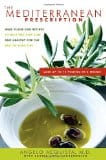
Maybe you don’t know what the Mediterranean diet is – or maybe you’re ready to eat food that fights chronic illness! Either way, check out these research studies that reveal how the Mediterranean diet reduces the effects of disease and increases longevity.
The Mediterranean diet is characterised by the consumption of fruit, vegetables, and legumes or pulses (beans, peas, chickpeas and lentils etc.), fish, olive oil and nuts. Research shows it lessens the chronic illness and reduces mortality rate.
This diet has been associated with a lesser chance of illness and increased well-being for many years now. But, a new study shows that the Mediterranean diet is also linked to increased mental and physical health.
If you don’t know how to incorporate the Mediterranean diet into your meals – much less what it is! – read The Mediterranean Prescription: Meal Plans and Recipes to Help You Stay Slim and Healthy for the Rest of Your Life.
And here are two research studies on how this diet reduces your chance of chronic illness (which I believe increases your chance of living harmoniously with disease!).
How the Mediterranean Diet Fights Chronic Illness
What is the Mediterranean diet? It’s a pyramid that combines food to be eaten daily, weekly and occasionally.
Main meals should never lack three basic elements: cereals, fruit and vegetables and dairy products. The Mediterranean diet must include a daily intake of at 1.5 to two litres of water. Olive oil constitutes the main source of fat for its nutritional quality and moderate consumption of wine and other fermented beverages is recommended. Fish, lean meat and eggs are the main sources of high quality animal protein and healthy fats.
At the top of the pyramid are sugar, sweets, cakes, pastries and sweetened beverages that should only be consumed occasionally and in small amounts.
The Mediterranean diet improves quality of life
A new study headed by the University of Las Palmas de Gran Canaria and the University of Navarra took the next step and analysed the influence of the Mediterranean diet on the quality of life of a sample of more than 11,000 university students over a period of four years.
“The progressive aging of the population in developed countries makes it even more interesting to find out those factors that can increase quality of life and the health of the population,” says Patricia Henríquez Sánchez, researcher and lead author of the study.
Dietary intake data was taken at the beginning of the study and self-perceived quality of life was measured after the four year monitoring period. In order to ascertain whether the Mediterranean diet was followed, consumption of vegetables, pulses, fruit, nuts, cereals and fish was positively valued whereas consumption of meat, diary products and alcohol was negatively valued.
These research results reveal that those who stick more to the Mediterranean diet score higher on the quality of life questionnaire in terms of physical and mental well-being. This link is even stronger in terms of physical quality of life. ~ from Mediterranean Diet Is Definitively Linked to Quality of Life on ScienceDaily, published in the European Journal of Clinical Nutrition.
Perhaps – and I’m just speculating here – the Mediterranean diet reduces inflammation, which helps fight chronic illnesses like ulcerative colitis.
The Mediterranean diet protects against chronic illness
Just today, I wrote an article about not being scared of death. I think we shouldn’t fight chronic illness – we should live in harmony with it. But when I find research that says that what we eat can protect us from disease, then I’m inclined to pick up my weapons and do battle!
Research shows that sticking to a full Mediterranean diet provides substantial protection against major chronic diseases including heart disease, cancer and Parkinson’s and Alzheimer’s disease. The Mediterranean diet from populations bordering the Mediterranean Sea has a reputation for being a model of healthy eating and contributing to better health and quality of life. It is rich in olive oil, grains, fruits, nuts, vegetables, and fish, but low in meat, dairy products and alcohol.
Previous research on the Mediterranean diet suggests that it has a protective role in cardiovascular disease and cancer, but no study has reviewed all the available data for a possible association between sticking to the Mediterranean diet, premature death, and the occurrence of chronic diseases in the general population.
A team of researchers from the University of Florence assessed 12 international research studies on the Mediterranean diet, which collectively included more than 1.5 million participants. Their dietary habits and health were tracked for follow-up periods ranging from three to 18 years. All the studies examined the concept of using a numerical score to estimate how much people stuck to the diet, called an ‘adherence score’.
The researchers found that people who stuck strictly to a Mediterranean diet had significant improvements in their health, including a 9% drop in overall mortality, a 9% drop in mortality from cardiovascular disease, a 13% reduction in incidence of Parkinson and Alzheimer’s disease, and a 6% reduction in cancer.
These findings confirm the past research, which encourages a Mediterranean-like diet for the prevention of major chronic diseases. ~ from Mediterranean Diet Can Help Reduce Deaths From Major Chronic Diseases on ScienceDaily, published in the British Medical Journal.
The Mediterranean diet and brain diseases, such as Alzheimer’s and Parkinson’s
Several large observational studies (research studies that look at people’s eating habits, and then assess their health many years later) suggest that people on the Mediterranean diet are much less likely to develop Alzheimer’s disease than people who eat a more typical western diet.
These studies also suggest that people with Alzheimer’s Disease who eat a Mediterranean Diet have a greatly reduced mortality rate (by up to 70%), and longer life span (by an average of four years). The one study to date looking specifically at Parkinson’s disease and the Mediterranean diet found that people eating the diet had a reduced risk (by approximately 25%) of developing this disease.
Other health benefits of the Mediterranean diet include a reduced risk of developing heart disease, diabetes (by as much as 80%) and cancer. This diet also reduces death rates from heart disease, cancer and other health issues.
Do you think food can fight chronic illness – or are you already sold on the Mediterranean diet? Comments welcome below…




